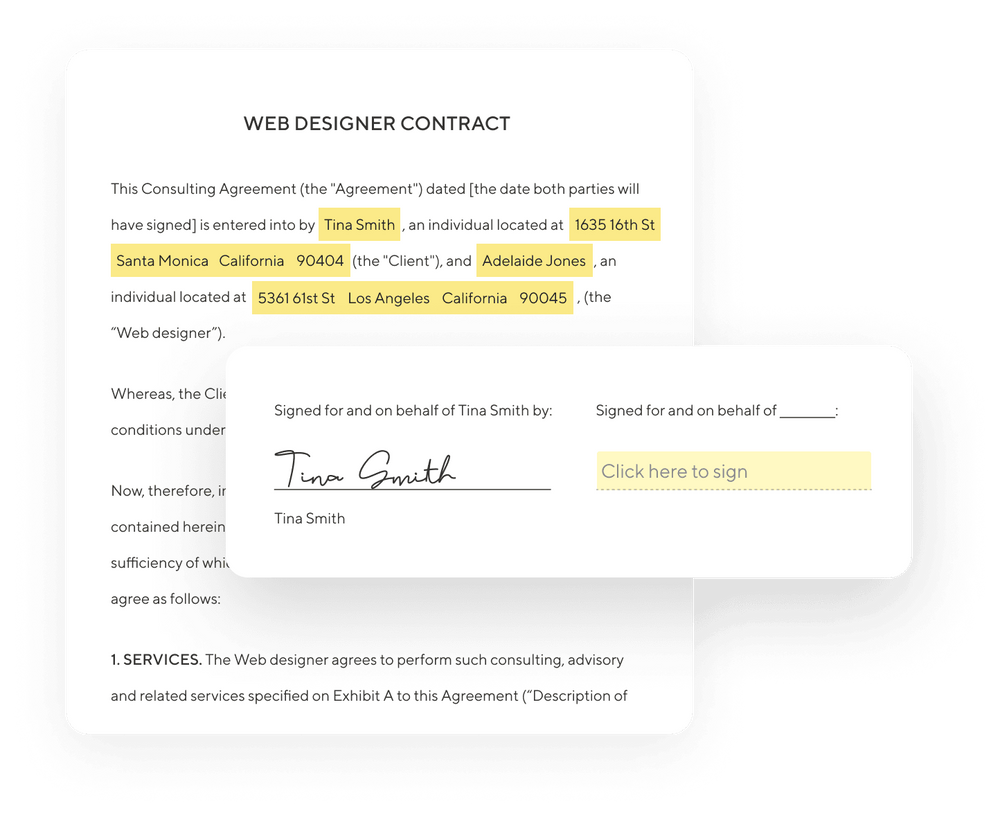There are now nearly 30 million freelance contractors—this number rose greatly during the pandemic. This means that more companies are turning to hire consultants regularly.
If you work as a consultant or an independent contractor, you may have considered writing up a contract to use when working with clients.
It will be beneficial in the long run to have an agreement that both the consultant and client agree to before getting into a consulting relationship.
In this article, we're going to break down everything you need to know about consulting contracts.
What is a consultant?
A consultant is a person who has extensive knowledge and provides professional advice in a particular field to either an organization or to an individual.
There is no legal protection under the term 'consultant' and you don't need to pass any special exams to become a one. So really, anyone out there could adopt the title and offer consulting services for any field.
There are three key distinctions from being a consultant to being of the regular profession:
- In return for their professional services, a consultant will charge a fee.
- A consultant operates independently from the client, so there are no conflicts of interest between the client's issues and the services provided.
- A consultant operates professionally, which ranges from having the right qualifications to ensuring high-quality service.
What is a consulting contract?
A consulting contract sets out the terms and conditions of the arrangement between the consultant and the client or customer who is seeking the consultant's services.
A contract will highlight your rights, restrictions and obligations as a service provider and it's important to make sure you understand and are aware of these things.
A consulting agreement should do the following:
- Protect your intellectual property
- Include a confidentiality clause to protect client's confidential information
- Include a nondisclosure agreement to protect information dealt with during the time period of your professional relationship, for example, business plans and trade secrets
- Include an indemnification clause and compensation terms that allow the client to be covered in the event the consultant is liable for a breach of contract
- Set out the services to be provided, and the timescale expected
- Set out ownership rights for materials created
Why is a consulting contract important?
In order to minimize the liabilities for your freelance business and avoid legal action, a contract will have important legal distinctions and you need to be aware of them.
Many organizations work with independent contractors and small businesses frequently, so you may work with some clients who have a contract in place from their end for you to sign. This is very common and not unreasonable, but make sure that you are happy with the terms and that you are covered as well.
With the stricter IR35 rules that have come into place, businesses may be more wary of hiring consultants.
Make sure that you look over the entire agreement and you should always seek legal advice if you're unsure about anything in the contracting agreement that a client is asking you to sign.
You may need to pay reasonable legal fees for this, but it's worth it to cover yourself.
It's in the client's interest that the consultant agrees to the terms of the consulting agreement to avoid any hiccups that may come about during the course of the contractor providing his or her services.
Key ingredients of a consulting agreement or contract
Although some clients may provide a contract, it's important that you also create your own consulting agreement that your client agrees to. Having your own agreement will help if the client doesn’t have one. It may also highlight any shortcomings or issues with the client’s agreement.
We've broken down some of the key ingredients that you must include in your consulting agreement or contract.
The scope of the work
It's vital that you set out just how much work and which services you're providing for your client. Not doing this could risk them bombarding you with mountains of work that you haven't agreed to.
It's important that you have a clear, written record of the services that you will be providing, to which both parties agree.
Pay and invoicing rates
Another important clause to include in your consulting agreement is the rate of pay. This will keep you covered to ensure that you are compensated for the services you have provided, assuming you have provided them.
It's also a good idea to set out payment terms in the contract. For example, a payment method and when the client should make payments will help you to be paid fully and promptly.
Make sure that you also set out in your consulting agreement that they must pay even if the client doesn't use your work or uses other material instead.
Timelines and deadlines
Setting out the schedule, timelines and deadlines is a vital clause that you should include in your contract so that you and your client know what to expect and when to expect it.
A clear project timeline should avoid you being chased by your client to send over the work. It will also provide some accountability for you to ensure that you complete your work in a timely manner.
Termination clauses
Another hugely important ingredient that you should include is termination clauses. While neither party would want this to happen, it's important that you're prepared for the worst.
People on either side may have personal or financial issues, which means the project can no longer continue.
A "termination of this agreement" clause ensures both parties acknowledge it covers the terms of contract termination and in such an event.
Dispute resolution
Adding a dispute resolution clause that both parties agree to is another key factor to include in your agreement or contract.
It's likely that at least one party will have an issue at some point during the project, so it's vital that you are prepared for this and have a thought-out plan in place to deal with such an event.
Tips for Success as a Consultant
Being a great consultant isn't just about having the experience and knowledge to aid the client's company.
Great consultants also have a wide range of qualities that make them valuable to their clients—some learned and some based on personality traits.
Being a good teacher
Don't just do the work for your clients, but talk them through the steps that you're taking and why you're taking them. This will be extremely useful for your clients and they won't forget you.
It will also increase the likelihood that they'll likely keep coming back to use your services.
Being able to build trust
Coming into a business as an outsider can be tricky. It's important that you take time to get to know your clients, understand what they expect of you and set out what you expect of them. Being successful as a consultant means showing that you are reliable and trustworthy.
So it's important that you stick to any promises that you make. For example, if you agree to attend a meeting, make sure that you're there.
Being trustworthy also means not breaching any terms of your contract, or not getting your client's prior written consent before doing something.
For example, disclosing private details like contact information or proprietary information to other clients. Such a breach could leave you liable for disclosing sensitive material.
Put your client's needs first
It's important you always remember that you're there for your client and to help them with your business. Yes, you're very skilled at your job and your freelancing business is great. But you're being paid to use your expertise for them.
Always remember the task at hand and don't get too distracted by focusing on or giving opinions on areas that you haven't been tasked with.
Be flexible
While it is always important to focus on what they have tasked you with, your client may come to you with other problems that they need your help with that aren't the primary job they have assigned you to.
However, it's hugely important to remember what's stated in your contract. Don't go over the scope of work that was set out in your contract, as you have no guarantee that they will pay you for doing extra work.
If it's a small matter, it may be okay to give them a little something extra (since this could increase your chances of them hiring you again). But if they come to you with a task that may take many hours or is outside the scope of your contract, let them know that you're going to update the terms and have them sign it before continuing with any extra work.
Being an excellent communicator and listener
While this is probably advice that you hear over and over again, it really bears repeating. You only have a small amount of time to make an impact on a company, so it's crucial that you optimize your time by being efficient in your communication.
Make sure everything is clear to avoid any misunderstandings, so you don't need to waste any time.
FAQ
What should a consultant contract include?
- The scope of the work - It's vital that you set out just how much work that you're providing for your client. Not doing this could risk them bombarding you with mountains of work that you haven't agreed to.
- Pay and invoicing rates - This will keep you covered to ensure that they compensate you for all the services you provide.
- Timelines and deadlines - Set out timelines and deadlines so that your client knows what to expect and when
- Termination clauses - This keeps both parties covered in the event of any unforeseen circumstances that result in the project not going ahead.
- Dispute resolution - Having a well-thought-out dispute resolution plan is vital in any case of conflict within the contract
How do you write a consultant contract?
While you can find consultant contract templates online, we would recommend drafting your own and ensure that you include all the key points that we have covered, so that you're prepared for any situation.
We would recommend that you have a lawyer review your contract and ensure that you have all the clauses that will decrease any chances of legal action.
Is a consultancy agreement a contract?
A consultancy agreement and a contract are the same things. Both set out the terms and conditions of your services and what the client should expect.
These documents are there to manage client expectations. While it's important that you meet your client's desires, make sure that you cover yourself and your consulting business.




